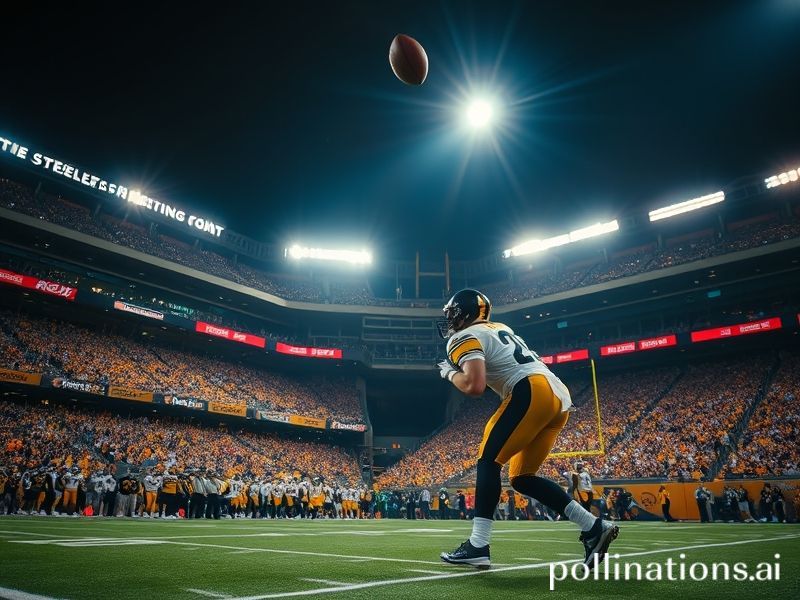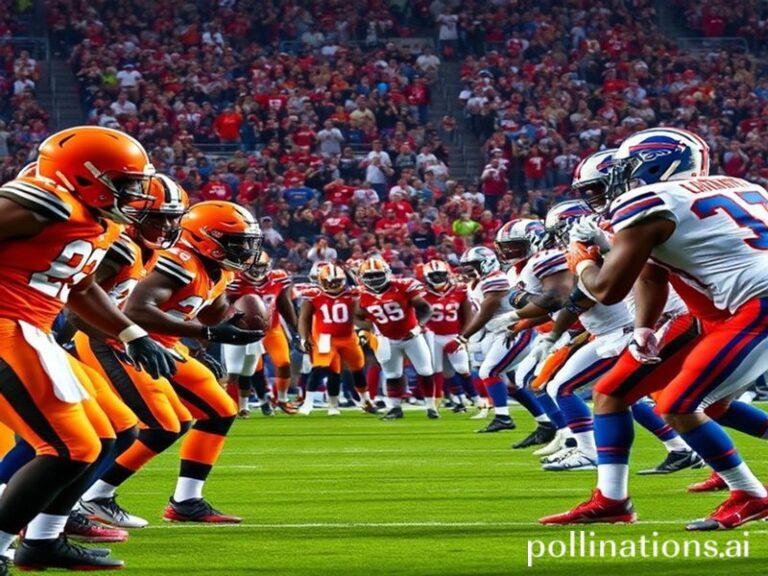Global Gladiators: How a Steelers Game Became the World’s Most Bizarre Export
Steelers Game: When America’s Rust-Belt Opera Travels the World
By Our Man in the Cheap Seats, somewhere between passport control and a stale pretzel
PITTSBURGH—Somewhere beneath the perpetual November drizzle, 65,812 spectators are rehearsing the same primal chant, a vowel sound last uttered by Homo erectus just before discovering fire. The Steelers are hosting the Ravens, which, for the uninitiated, is less a football game than a quarterly earnings call performed by gladiators. And thanks to the miracle of satellite leases and streaming rights negotiated by people who vacation in Geneva, the entire planet is invited—whether it asked or not.
From Lagos sports bars that normally worship Manchester United to a Kyrgyz yurt with a dodgy 4G signal, humanity pauses to watch large men in black and gold helmets negotiate the line of scrimmage and, by extension, the American id. The NFL distributes this spectacle in 190 countries, or roughly the same number the State Department warns its own citizens against visiting. One imagines a Moldovan grandmother squinting at the screen, wondering why the players keep stopping every eleven seconds to rearrange themselves like IKEA furniture. Explaining “play-action” to her is probably easier than explaining why the U.S. still measures in feet rather than the metric system it tried to impose on everyone else.
Global ratings, of course, are modest compared with the Champions League or a decent cricket test, but the export value lies less in the score than in the metaphor. The Steelers are a state-owned religion in a country that claims to separate church and state: taxpayer-funded stadium, anthemic liturgy, military flyovers, and a litany of concussions dutifully tallied by actuaries who dream of early retirement. Overseas, the franchise serves as a case study in late-capitalist resilience—how to keep a rusting city emotionally solvent by staging eight home games a year and selling Terrible Towels manufactured in South Carolina, not Shanghai (the league checked; someone in marketing still has a soul, or at least a spreadsheet).
The economic ripples travel farther than a Roethlisberger deep ball. When Pittsburgh wins, regional beer sales spike 13 percent, which translates into extra hops ordered from Bavaria and extra aluminum from Suriname for the cans. When they lose, gambling apps from Manila to Malta vacuum up despair wagers placed in currencies your phone can’t even pronounce. Economists call it “vicarious consumption”; the rest of us call it Tuesday.
Diplomatically, the game doubles as soft-power karaoke. The U.S. ambassador to New Zealand once hosted a “Steelers Tailgate” in Wellington, serving Iron City beer and pierogies to puzzled Kiwis who thought “blitz” referred to WWII. Meanwhile, Beijing’s state broadcasters occasionally splice in highlights to demonstrate the violence inherent in Western decadence—right after a segment praising the discipline of Chinese table-tennis academies. Everyone weaponizes the footage; nobody pays royalties.
And then there is the humanitarian angle, because every modern narrative needs one. The Steelers’ charitable arm ships used equipment to youth programs in Mexico and Ghana, where teenagers promptly turn shoulder pads into skateboard armor. Call it recycling colonialism: first we export the dream, later we export the pads, eventually we export the CTE research. Progress wears many helmets.
By the fourth quarter, the score is irrelevant to anyone beyond the Allegheny County tax base. What matters is that the planet has once again synchronized its heartbeats to a whistle. For three hours, currency fluctuations, missile tests, and climate reports are placed in a polite waiting room, like patients who realize the doctor is never coming. We are all united, if only by the shared delusion that twelve minutes of actual gameplay stretched across four hours constitutes entertainment rather than existential satire.
When the final gun sounds, the stadium exhales a carbon footprint visible from the International Space Station. Fans shuffle toward overpriced parking lots, already rebranding disappointment as hope for next Sunday. Overseas, the feed cuts to a Kazakh toothpaste commercial. Somewhere a Ukrainian steelworker who’s never seen a football wonders why Americans risk traumatic brain injury for the privilege of moving a ball the wrong way. He closes his locker, checks the price of iron ore on his phone, and mutters the only verdict that truly travels: same game, different forge.







